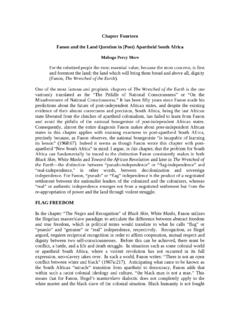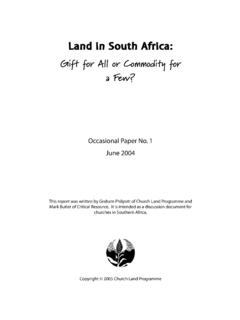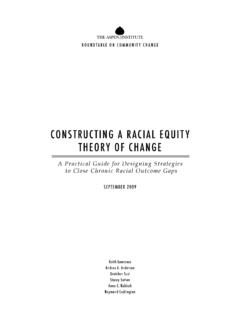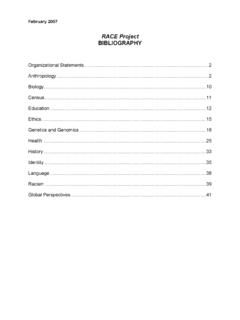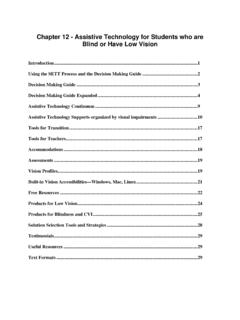Transcription of Introduction to Steve Biko’s I Write What I Like
1 Introduction to Steve biko s I Write What I Likeby Lewis GordonSteve Bantu biko was a courageous man. This is not to say that he was callously neglectful of the value of life, including his own, but rather he was a man for whom life was so valuable that the fear of death could be transcended. The consequence was that he found a way for word and deed to meet and thus to achieve the urgently political and the genuinely liberating. Brutalized to death in the flesh, he left his words to unfold through three decades in a continued challenge to every human being to carry on the fight for our humanity. Dust though his body has become, his ideas live hold in your hand, dear reader, a classic work in black political thought and the liberation struggle for all humankind.
2 I mention both to emphasize the paradox offered by blackness as the limit as the periphery or the margin in the modern, racist world where whites are treated as the carriers of universal humanity, although the world of color often admits the genuinely universal and often hidden aspects of the modern world: its dirty laundry or, in the formulation of the Latin American philosopher Enrique Dussel, its underside. An imbalance of power and perspective is the consequence of white privilege, and it has led to what I call a theodicy of the West. Theodicy is the effort to account for the compatibility of evil or injustice with the existence of an omnipotent, omniscient, and good God.
3 If God is all powerful, all knowing, and all good, why doesn t God do something about injustice in the world? White supremacists rationalize modern racism as a consequence of God s favor of white people. biko challenges such views of God in Black Souls in White Skins? in which he writes that the revolt of black youth is the most reasonable response: The anachronism of a well meaning God who allows people lo suffer continually under an obviously immoral system is not lost to young blacks who continue to drop out of Church by the hundreds. He calls for a liberating message: |The Bible] must rather preach that it is a sin to allow oneself to be oppressed. God has been replaced in the modern world by an order or system that is to be maintained at all cost.
4 In theological language, such rationalization of modern racism is a form of idolatry because it treats the system as God, although biko does not put it this way. Racism can be described as a form of idolatry in that it holds one class of people above others as intrinsically superior. This means that it creates a double standard for human membership. On the one hand, if those who are below consider themselves human, then those who are above are suprahuman or demigods. And if those who are above consider themselves human, then those who are below are subhuman and closer to animals. This is the relational theory of racism. It enables us to see the problem of normativity that emerges in what Frantz Fanon and subsequently David Theo Goldberg call racist culture.
5 Those who place all others beneath themselves create a situation in which the assertion of their humanity and their superiority becomes superfluous. They literally are the standpoint of nil reality. This means, then, that racism is fundamentally asymmetrical, and it is this pervasive asymmetry that marks many of the contradictions in efforts from within the racist system to liberate blacks. biko s trenchant criticisms of unequal power relations bring this argument to the of biko s energy is devoted to criticizing the liberal in both the condescending white and the idiotic black forms. The black liberal is idiotic because black people lack power in a white controlled system.
6 The white liberal, on the other hand, operates from the vantage point of having something perhaps a great deal to lose in the event of progressive social change. The white liberal s offer to help has an air of condescension because it masks a profound existential investment in the continuation of the racist system. Thus, the white liberal always insists on offering the 1theoretical or interpretive strategies against antiblack racism, but such strategies often act to preserve the need for white liberals as the most cherished members and overseers of values in their society. In biko s words: I am against the superior inferior white black stratification that makes the white a perpetual teacher and the black a perpetual pupil (and a poor one at that).
7 biko refuses to be told what to think and what to Write . I Write what I like, he declares under the clever pseudonym Frank Talk. The clarity of Frank Talk is a demand for truth. He reveals here the unique, doubled relationship blacks have with European civilizations: blacks face a world of lies in which they are forced to pretend as true that which is false and pretend as false that which is true. This is the insight behind what is perhaps the most powerful trope of black theoretical reflection, introduced by W. E. B. Du Bois more than a century ago double consciousness. Double consciousness is knowing the particularity of the while world in the face of its enforced claim to universality.
8 Double consciousness is knowing that much of the history offered up to black people its many interpretations and echoes of while superiority and black inferiority, of white heroism and black cowardice, and even the temporal and geographical location of history s beginning as a step off of the African continent is a falsehood that blacks are forced to treat as truth in so many countless ways. Double consciousness, in other words, is knowing a lie while living its consciousness signals the most famous, and in some circles infamous, concept in biko s thought: Black Consciousness. The roots of Black Consciousness go back almost two centuries to the thought of Martin Delaney.
9 A proud, African born black man living in the United States in the nineteenth century, Delaney advanced the view that black people s appreciation of blackness was a key dimension of their eventual liberation. His argument addresses the force of the signs and symbols through which people are seen and understood in their society. Seeking value in blackness was a message that influenced generations of black intellectuals in the nineteenth century straight through to Du Bois and his nationalist rival Marcus Garvey. The importance of this move, which we may call symbolic resistance, continued through reflections by the philosopher and critic Alain Locke during the Harlem renaissance and into the salon of the Nardal sisters in Paris from which the Negritude movement emerged in Aime Cesaire s coinage and Leopold Senghor s existential ruminations.
10 Writing on Cesaire s return to Martinique in 1939, Fanon described, in his West Indians and Africans, included in his collection of essays Toward the African Revolution, the shock, the disrupting force, of seeking the good and beautiful in things black: for the first time a lycee teacher a man, therefore, who was apparently worthy of respect, was seen to announce quite simply to West Indian society that it is fine and good to be a Negro. To be sure, this created a scandal. It was said al the time that he was a little mad and his colleagues went out of their way to give details as to his supposed ailment. In the 1960s, New World blacks such as Malcolm X, Charles Hamilton, and Stokley Carmichael (Kwame Ture) took another turn in reconstructing everyone s altitude toward things black through the conjunction of black with power to allay the costs of associating blackness with impotence.
